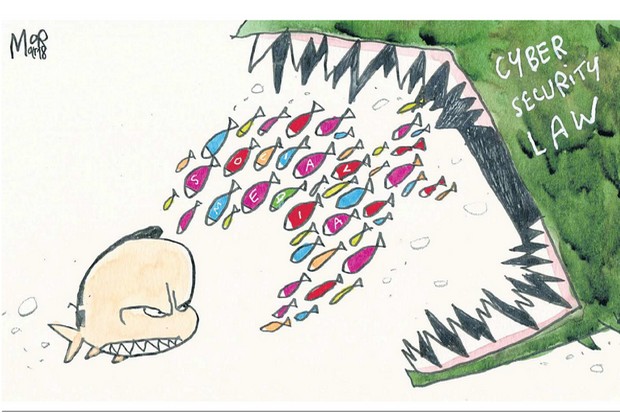
Foreign Affairs Minister Don Pramudwinai, in his op-ed published on Tuesday in the Bangkok Post, underscored "a digital Asean" as one of the priorities which Thailand as the Asean chair envisions for the region to move "towards the blessings of peace, freedom and prosperity". On the same day, Vietnam's cybersecurity law, described by critics as "a totalitarian model of information control", took effect.
Without a doubt, such a law does not provide an enabling environment for the "digital Asean" Mr Don has envisioned. But the minister would find it hard to comment on it because his government approved a similar law late last month.
Despite their differences, both Vietnam's cybersecurity law and Thailand's cybersecurity bill will assert the government's control over the internet at the cost of businesses and online users.

Vietnam describes its new law as an effort to stave off cyber attacks, as well as weeding out "hostile and reactionary forces" using the internet to stir up violence and dissent. The latter objective means companies providing internet services will be required to remove contents deemed to be against the government and hand over user data if asked by the state.
Not only will the Vietnamese law threaten online freedom in a state where activists are jailed for their social media posts, it will also impose a burden on domestic and foreign enterprises such as internet service providers and e-commerce sites. This is not a promising environment for foreign investors.
It is also not a promising sign for "freedom", in a region where countries, such as Indonesia, Singapore and Cambodia, have becoming increasingly active in counteracting online information authorities deemed as "fake news".
Thailand has made the situation worse. The National Legislative Assembly (NLA) passed the cybersecurity bill on Dec 28 in its first reading following its approval by the cabinet.
The bill has been revised to address previous concerns over the sweeping powers to be granted to a new government agency -- the National Cybersecurity Committee (NCSC) -- to conduct online surveillance, order companies to remove contents or seize computers of organisations or individuals without judicial oversight.
Even though the revised version added requires authorities to seek court orders for such actions, it does provide an exception.
The NCSC can bypass the need for a court order in handling cyber threats it deems as an emergency. In such cases, parties suffering from the handling of cyber threats will also be barred from appealing NCSC orders.
The government and security officers in the past years have cited a threat to national security as a reason to censor the internet and press charges on dissidents and activists.
The loophole in the bill that allows authorities to bypass judicial oversight will give them ample room to abuse the new law to serve the same purpose.
Activists also slammed the revised bill for exempting state security agencies and large corporations from this law.
Additionally, the bill contains several vague definitions which cause confusions in the business community and activists, both of whom will have to surrender data upon the NCSC's request as they are subject to the duties and liabilities outlined in the bill.
If Thailand really wants to promote a "digital Asean", it should lead by example.
Respect for online liberties, as well as internationally-accepted laws are critical for the country to successfully capitalise and benefit from the digital age.
In its upcoming readings, the NLA should not pass the bill in its current form. Instead, it should allow substantial changes to it. Otherwise, it should leave that job to elected lawmakers after the general election this year.
For now, the new cybersecurity law in Vietnam and the cybersecurity bill in Thailand run counter to the "digital Asean" goal.
Thailand's refusal to come up with a better version of the bill will turn its future vision into a hypocritical statement.
